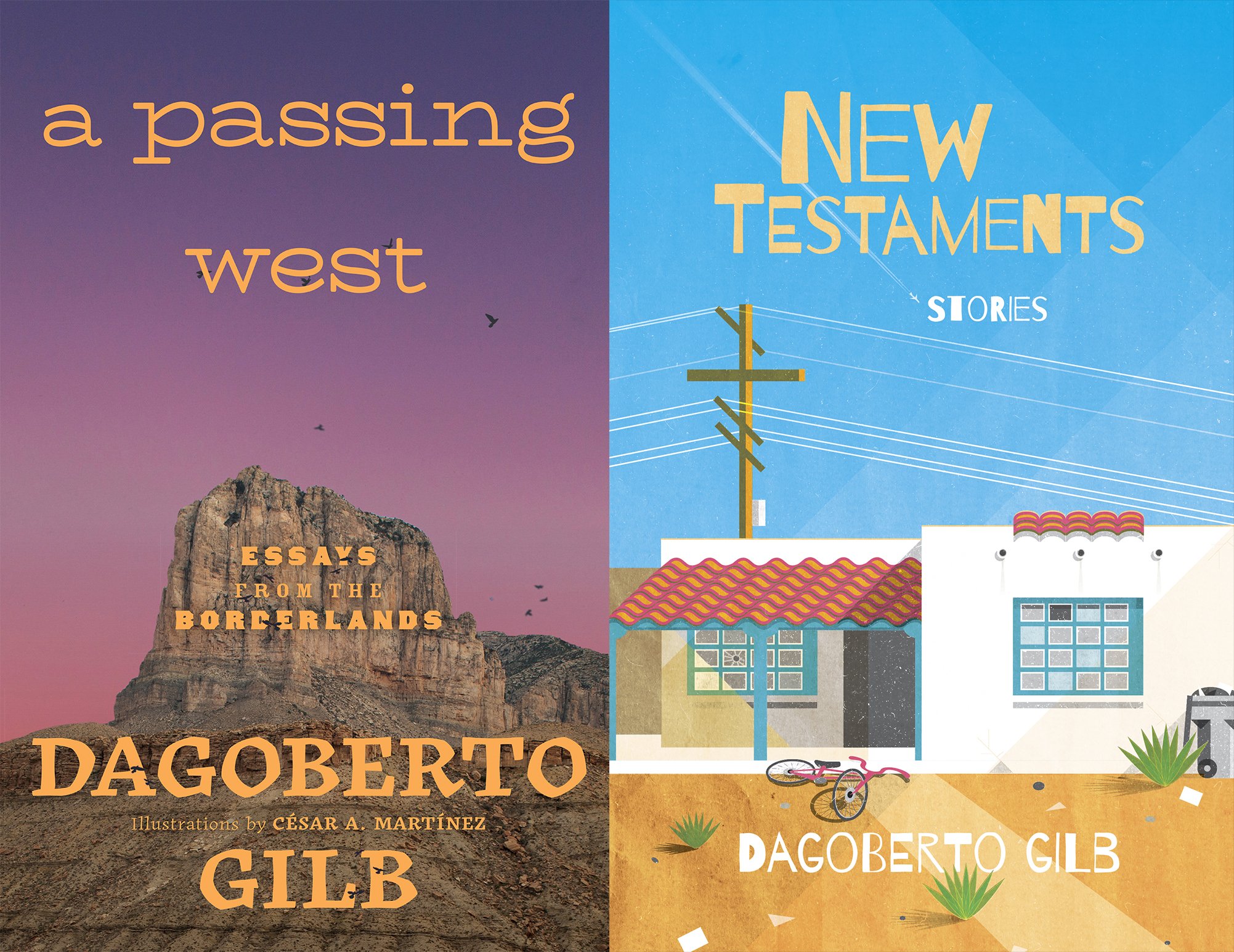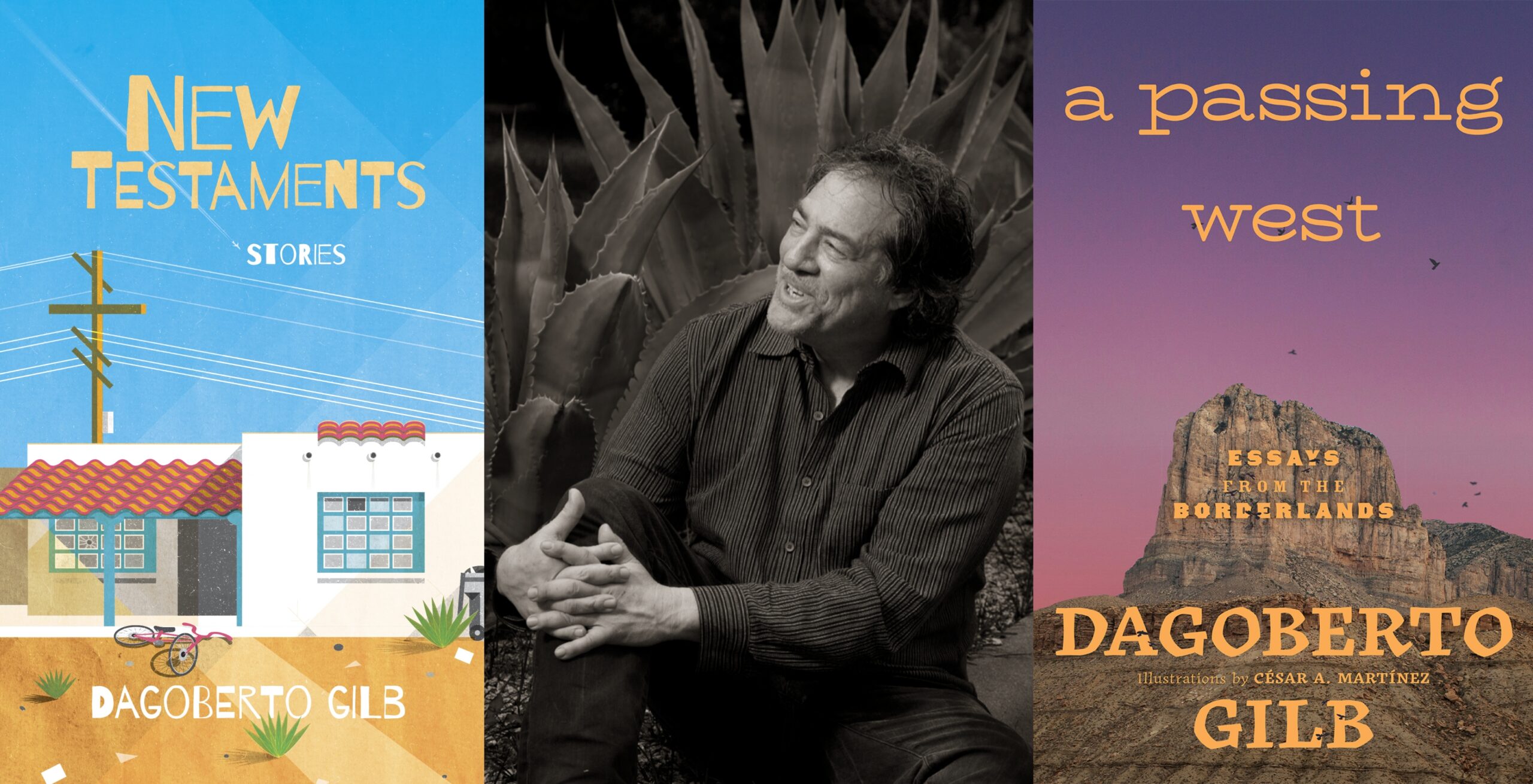Since the publication of his 1985 chapbook of stories, Winners on the Pass Line, Dagoberto Gilb has been altering the literary landscape by offering his readers strong working class-centered fiction about Latinos in the Southwest. His efforts have earned him awards and honors such as the PEN/Hemingway Award for his breakthrough collection The Magic of Blood. Now, the 11 pieces in his latest collection, New Testaments—released October 1 by City Lights—further cement his reputation as a master of the short story by quietly incorporating a theme that has hitherto been largely latent in his work: surrender as a form of salvation.
In this spry and soulful selection of recent stories culled from publications such as Alta Journal, A Public Space, and Zyzzyva, Gilb, now 74, returns to familiar themes of families dealing with economic disparity and men caught in what could only be called a kind of dangerous love. But in a book where toxicity can take the form of a criminally bent cousin or a literal toxic cloud, characters often abandon anger for a retreat into tranquility.
An ex-musician rationalizes how the stolen photograph of an ex-lover might be a rite of passage for an adolescent thief, a former high-rise construction worker visiting a past paramour at a Starbucks refrains from physically countering a lunatic barking incoherent racist epitaphs at him, and a young man trying to connect with a father he scarcely knows at a Mexican restaurant that sells Peking duck disappears into Mexico when the meeting is cut short by a conflagration connected to the Symbionese Liberation Army and the LAPD.
New Testaments is a book about letting go. In the fable-like “Two Red Foxes,” the inconvenient adjustments to advancing age are explored in a story about an elderly man who is being driven “a little crazy” by his inability to locate a mini-mag flashlight. Our hero spies the dreamlike canines outside his home like some kid in a fairy tale: “He stared at the morning on the other side of the glass, and his eyes filled with the wonder of a child. At first he didn’t believe what he saw. It shook him it was so sudden. He wasn’t certain if they had been there all along, or just appeared in the corner of the window. They were two. A few heartbeats came and went. Not dogs. Another pause. Foxes. They were foxes.” Seeing the foxes is a kind of miracle of private triumph for the protagonist, but attempts to share his vision with family and even a lifelong friend lead to suspicion of senility.

The theme of disability—Gilb himself is a stroke survivor—is tackled in “The Dick, Casillas,” a story about an aging ex-athlete who enjoys working out at a gym and platonically chatting up a young woman at the desk. The woman’s hotheaded trainer boyfriend keeps interrupting our narrator’s attempts to engage with the gal. Upon acting out his impulse to come to physical blows with the man, our hero gets knocked down and injured in a way that has him wearing a boot with a Velcro strap and receiving a humbling lesson from a famous retired local coach.
“You need help?” the retired coach asks our wounded protagonist. “My pride,” our protagonist replies.
“You gotta let that go so you can see what’s really hurting,” the coach cautions.
As tempting as it is to yoke Gilb’s latest collection of fiction to his simultaneously released book of essays, A Passing West (from University of New Mexico Press), these books are different animals. New Testaments, with its stories about humble healing and how personal myths may patch up memory loss, is a patient beast. A Passing West is, with Gilb’s recollections of auto shop epiphanies and insider info about the Corona beers kept in Rolando Hinojosa’s University of Texas office minifridge, decidedly on the prowl.
For all its insight into the political implications of Tres Flores hair product and the right-wing propaganda regarding the Alamo, A Passing West—perhaps read best as a kind of memoir laced with critical asides, including recollections of working at an industrial laundry managed by the father he rarely dealt with and feelings of shame over a post-junior college book theft—reveals Gilb’s appetite for understanding his literary ancestry.
In “Rivera and Rulfo,” a short piece of praise for two of the author’s major influences, Gilb, a former construction worker and carpenter, pens a line that comfortably announces his pet peeve with contemporary letters. “Back in the old days of American Literature – call that pre-1975 – not every writer was expected to live and study in the same way,” he writes, taking a careful shot at the writers who have been quickened in creative writing workshops rather than the world of actual work.
Gilb’s long-awaited second collection of essays achieves cohesion while elaborating on topics as seemingly incommensurate as the historical significance of Taco Bell, the irony of Mexican immigrants moving to Iowa to work in the corn industry, and the literary world’s all too easy acceptance of Cormac McCarthy’s version of la frontera—furthering the suspicion that Gilb, while crafting minimalist fiction masterpieces like The Last Known Residence of Mickey Acuña and the lush bildungsroman, The Flowers, has been moonlighting as one of our bravest and most stylistically gifted cultural critics all along.

Both New Testaments and A Passing West share a deep concern with the hidden lives of Mexican-American people.
In the essay “Now You Don’t See Us, Still You Don’t,” Gilb appropriates Lao Tzu in order to explain the quiet triumph of his people, making their lives in an America that often won’t admit to their cultural influence on language and literature.
“The perfect gardener leaves the yard looking as though it were nature itself. The perfect thief goes in and out and no one knows the place was violated. The perfect carpenter is one whose doors open and close so seamlessly, whose cuts are so taken for granted, it never occurs to anyone to remark on any of the fine, skilled work done. And thus, say I, are we: So much given, and taken, all done so perfectly, it is simply that there are no footprints to be seen.”
Taken together, the pair of books reminds us that Dagoberto Gilb remains an artful advocate for the unseen.
(Except for the headline, this story has not been edited by PostX News and is published from a syndicated feed.)


